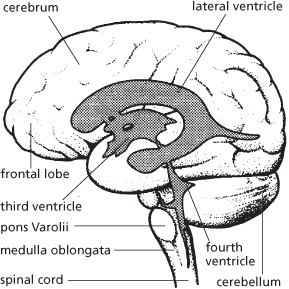1. The enlarged anterior part of the vertebrate central nervous system, which is encased within the cranium of the skull. Continuous with the spinal cord, the brain is surrounded by three membranes (see meninges) and bathed in cerebrospinal fluid, which fills internal cavities (ventricles). It functions as the main coordinating centre for nervous activity, receiving information (in the form of nerve impulses) from sense organs, interpreting it, and transmitting ‘instructions’ to muscles and other effectors. It is also the seat of intelligence and memory. The embryonic vertebrate brain is in three sections (see forebrain; hindbrain; midbrain), which become further differentiated during development into specialized regions. The main parts of the adult human brain are a highly developed cerebrum in the form of two cerebral hemispheres, a cerebellum, hypothalamus, and the brainstem comprising the medulla oblongata, pons, midbrain, and reticular formation (see illustration).
2. A concentration of nerve ganglia at the anterior end of an invertebrate animal.

The human brain in transverse section viewed from the left side
http://thebrain.mcgill.ca/index.php Multilevel exploration of brain structure and function, sponsored by the Canadian Institutes of Health Research
The brain contains something over 1011 neurons, each connected to something over three thousand others; this makes something over 1014 connections. If each connection is capable of ten different ‘weights’ or levels of activation, then the number of distinct brain states possible is 10 to the power of 1014. By comparison, the number of elementary particles in the universe is estimated at a miserly 1087. The progress of neuroscience in understanding brain function increases the urgency of reconciling the scientific view of a person as a conglomerate of connected cells, with the personal view of a unified, conscious, single self subject to experiences and capable of rational and voluntary action. If this reconciliation cannot be managed, then either the scientific view drives out the personal view (see eliminativism), or we end with some kind of dualism whereby the mental is different from and additional to the physical. Reconciling approaches include functionalism and physicalism, both hoping to show how mental explanation of events is a consistent supplement to their physical explanation, not a rival to it.
- annual rhythm
- annual ring
- annual snow-line
- annual variation
- annuity
- annuity factor
- annuity rate
- annular drainage
- annular eclipse
- annular flow
- annular modes
- annulation
- annulenes
- annulus
- ANOCOVA
- anode
- anode current
- anode dark space
- anode glow
- anode sludge
- anode stopper
- anodize
- anodizing
- anoetic
- anoikis